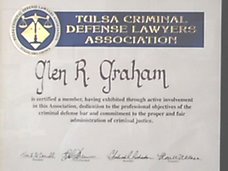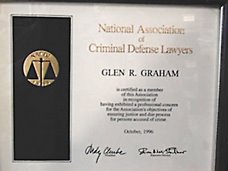Subject: False positive test results and right to independent testing
An "independent" lab test is most useful in a "residue" case where the same is so small it may have been used up in the testing by the state and then a motion to dismiss for lack of evidence or spoilation of evidence might be in order.
The below Moore case talks also about false positive test results for "cocaine" on certain cough medicines.
Some experts could probably testify about false postitive test results for "methamphetamine" but that would require money and time. Certainly, in "manufacturing" cases there are experts that could testify about false positives for certain components in the manufacturing process, such as paints or varnishes and the like that can give false positive test results.
http://www.oscn.net/applications/oscn/deliverdocument.asp?id=6666&hits=
Above is the link to this case which holds you have a right to an independent lab analysis:
Moore v. State, 1987 OK CR 149, 740 P.2d 731
We note that many other jurisdictions have determined that refusal to furnish a defendant, who has been charged with possession of a controlled dangerous substance, with a sample of the alleged contraband, is error. See, e.g., Jackson v. State, 243 So.2d 396, 398 (Miss. 1971) ("meaning of a "`fair trial' requires that material, tangible evidence must not be concealed from the defendant who is accused of crime. There is no good reason why the defendant in a civil case should be entitled to more liberal right to tangible evidence in the possession of his adversary . . . than is a person under a serious criminal charge"); Patterson v. State, 238 Ga. 204, 232 S.E.2d 233, 243 (1977) (where "acquittal is dependent upon the identification of the substances as contraband, due process of law requires that analysis of the substance not be left completely within the province of the state"); Warren v. State, 292 Ala. 71, 288 So.2d 826 (1973) (same); State v. Smith, 156 W. Va. 385, 193 S.E.2d 550 (1972) (defendant is entitled to be given an opportunity to examine contraband independently, as it may provide exculpatory evidence under Brady v. Maryland, 373 U.S. 83, 83 S.Ct. 1194, 10 L.Ed.2d 215 (1963). See also People v. Taylor, 54 Ill. App.3d 454, 369 N.E.2d 573, 12 Ill.Dec. 76 (1977); State v. Migliore, 261 La. 722, 260 So.2d 682 (1972).
¶15 The rationale used by these other jurisdictions would find support for a similar Oklahoma rule, under our prior precedent. We have said that "[p]rior to trial petitioner will be entitled to receive from the State any information that might tend to exculpate him or mitigate his punishment in the event of a conviction". Stafford v. District Court of Oklahoma County, 595 P.2d 797, 799 (Okl.Cr. 1979). As noted by the West Virginia Supreme Court in State v. Smith, supra, a defendant charged with the illegal possession or sale [740 P.2d 735] of contraband "should [be] permitted to examine a sample, under proper supervision and control, since it might [be] shown that the alleged [contraband] was not illegal . . ." State v. Smith, supra at 554. Judge Nix once noted, "[a] criminal trial is not a game of hide and seek. Disclosure of items in the possession of the State which would negate a defendant's guilt is dictated by fundamental fairness." Stevenson v. State, 486 P.2d 646, 650 (Okl.Cr. 1971). We have long equated notions of fundamental fairness with due process of law under our State Constitution. Cf. Jones v. State, 610 P.2d 818 (Okl.Cr. 1980) (although a defendant is not entitled to a perfect trial, he is entitled, as a matter of due process, to one that is fair). Finally, we note that in Melton v. State, supra, this Court determined that a person accused of exhibiting an obscene film was entitled to a pre-trial inspection of the file by an expert because "[i]n defending against this one narrow issue, expert testimony traditionally has played an important role in the defense of such charge." Id. at 205. Likewise, the identification of an alleged narcotic substance requires the services of an expert, and without the adequate assistance of an expert, an accused cannot successfully rebut the conclusions of the State. Therefore, we hold that due process considerations under Okla. Const. art. II, § 7 requires the State to afford the accused an opportunity to have his expert examine and test the samples of the substance which were actually examined by the State's experts. Of course, this rule does not extend to situations in which the sample is necessarily consumed in testing, nor does it forbid the trial court from placing conditions on the examination designed to adequately safeguard the integrity of the evidence.
¶16 We therefore hold the trial court erred in forbidding independent examination to this appellant.
¶17 We are cognizant of the fact that the prosecution offered the appellant certain random samples of the seized substance which was not tested by the State. The offering of random samples, not specifically tested by the State, provides the appellant with no reliable evidence for cross-examination, impeachment purposes, or for his case-in-chief. Therefore, this gesture by the State was insufficient to fulfill the discovery requirements set forth above.
We hold today that under our statute, all isomers of cocaine are not controlled substances. We arrive at this conclusion for three reasons. First, only one isomer, L-cocaine, is a derivative of the coca leaf, according to the testimony of both the State and defense experts (Tr. 510, 531, 535). See also United States v. Ross, 719 F.2d 615, 617 (2d Cir. 1983). Any other "isomer" of cocaine is controlled by statute only if it is "chemically equivalent or identical" with the substance derived from the coca leaf. 63 O.S. 1981 § 2-206 [63-2-206](A)(4).
False Positive Drug Test Results & the Right to Independent Testing
Subscribe to:
Post Comments (Atom)




No comments:
Post a Comment